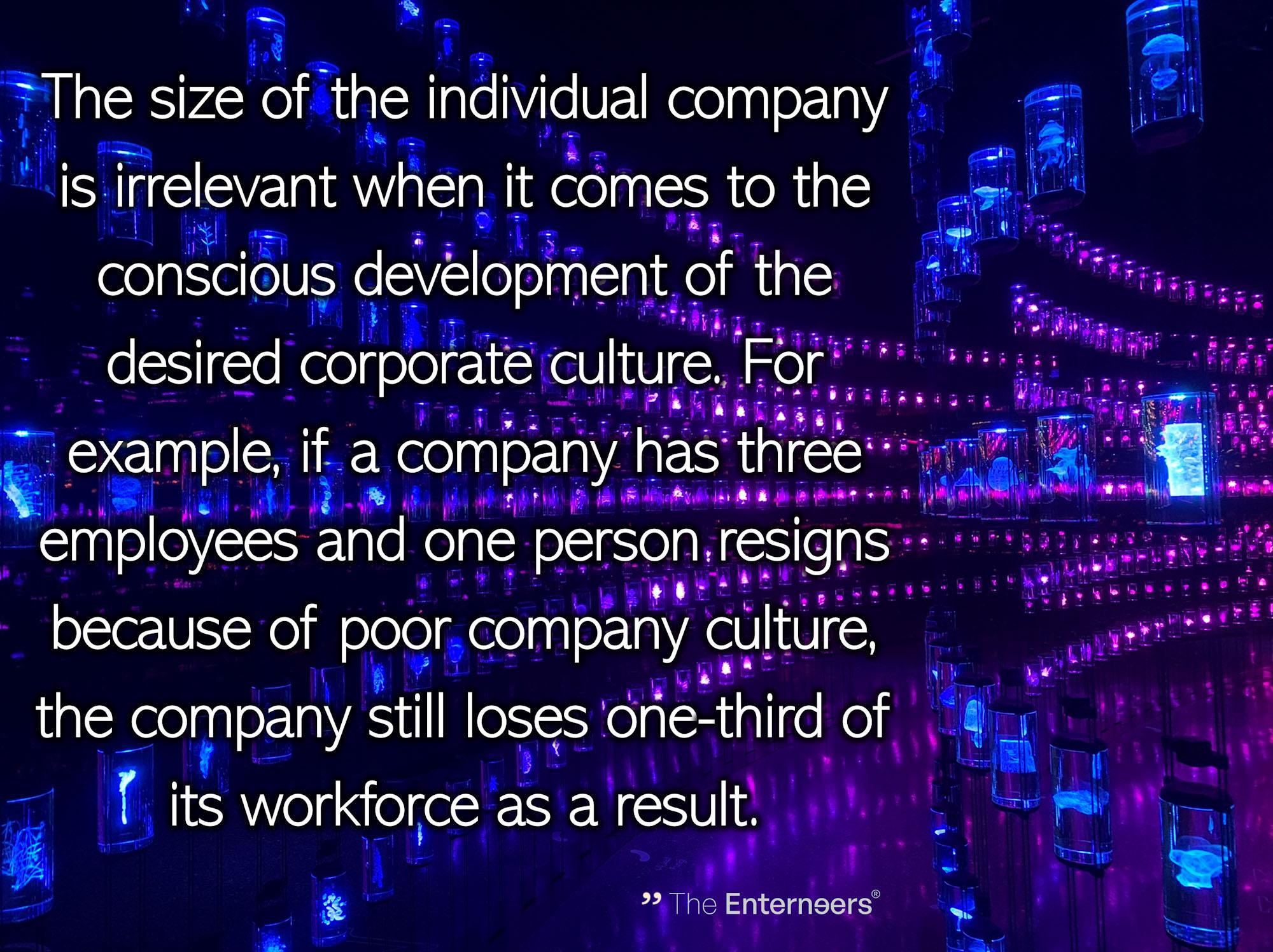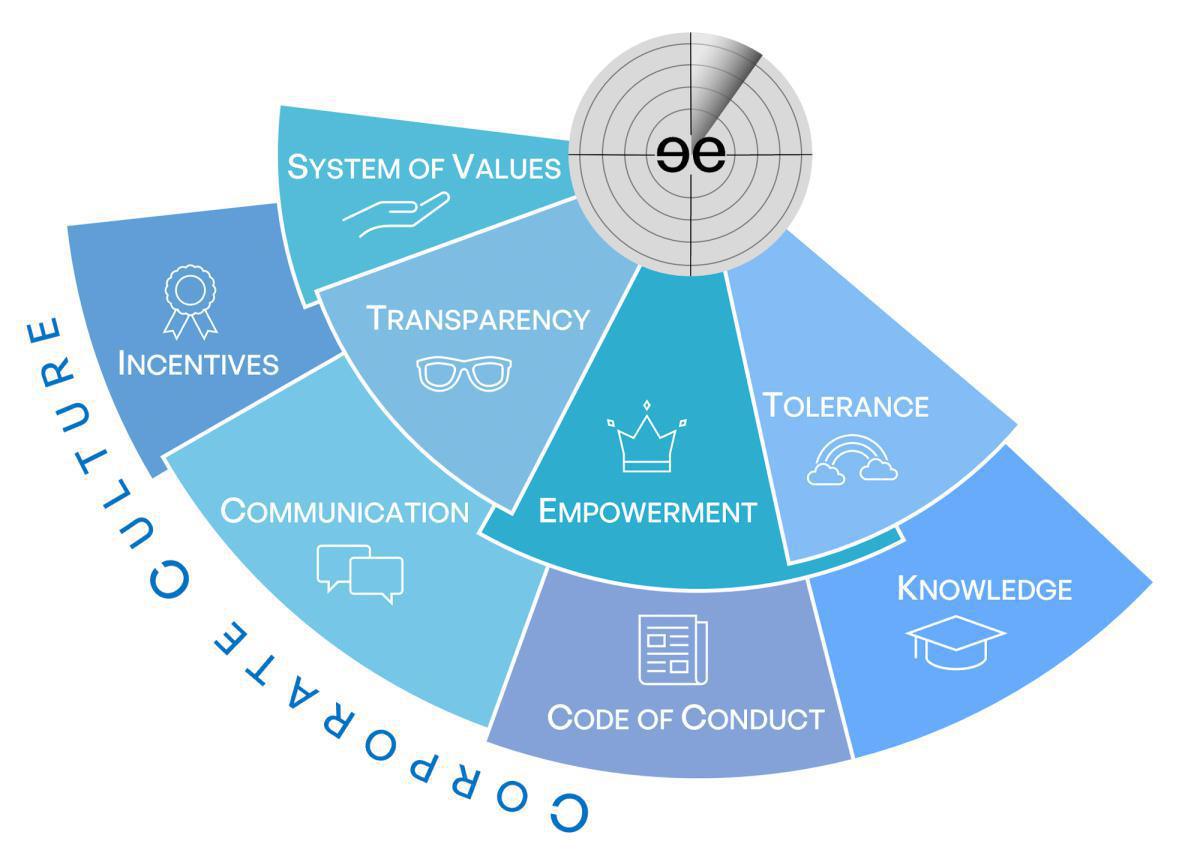Elements of Enterneering®/Culture/Corporate Culture
Every company has its own culture, which is shaped by each individual in the company, as well as, to a certain extent, external parties who interact with the company. The greater the position of power an individual holds, the greater their direct influence on how this culture is put into practice. Power, in this context, refers not only to the decision-making authority or the responsibility of an individual but also to their skills in influencing others.
As diverse as employees in a workplace can be, corporate cultures are equally diverse. Not infrequently, these cultures develop imperceptibly over a period of time, with no collective awareness, as a result of interactions within the company. Just as there are many different cultural manifestations of companies, markets, customers, employees, etc., there are also many different standards and criteria for evaluating corporate culture. It is not a question of black or white; there is no culture that is all bad or perfect. In a growing company, as complexity and market penetration increase, one thing that should not be allowed to happen is for the company culture to become imperceptibly ingrained without having been subjected to any reflection or evaluation. Once cultural grievances or 'unfavourable' cultural conditions become entrenched in a company, any successful change will usually require major effort.

The development of corporate culture is one of the primary tasks of every entrepreneur, and this should be defined jointly by management and employees. Delegating this task to one individual or staff position and then measuring implementation success from 'above' or from the 'sidelines' cannot, by its very nature, lead to sustainable development. In such scenarios, instructions or concepts from the designated person(s) will be able to change the corporate culture only to a very small extent. If personal behaviour patterns, real-life values and social interaction among those with influence and decision-making power do not change or 'improve', the resulting corporate culture will not truly change either. It has been observed in practice that in situations like this, sub-cultures develop within teams and areas that do not fall within any overarching bracket.
Corporate culture is associated with the ways of thinking, the behaviour patterns and the communication in the company. It is based on a set of values, including trust, equity and satisfaction. Once established, these values allow guidelines and norms to be put in place.
For example, if the company values a good relationship with customers, its established policy may be to always communicate courteously with customers, actively address their needs and always greet them with a smile.
If, instead, value is placed on hard work, then going above and beyond what is expected and a willingness to adjust one’s personal schedule accordingly will certainly be the norm.
The culture that is practised and experienced in a company is an essential driver for the motivation and retention of employees, for the development of their future performance and for the health of all those who work there. However, corporate culture is also an important factor when it comes to the willingness and ability of employees to successfully implement major changes, including innovations.
In fact, neglecting the importance of corporate culture is one of the most frequently cited reasons for the failure of restructuring and development processes. A company’s culture also influences its ability to successfully distribute tasks among people with different social and cultural backgrounds and to optimise recruiting. The culture determines whether discussion and dissent are possible, or whether authoritarian rule prevails, whether mistakes are learned from or punished, etc. Having an established culture also reduces the risk of fraud and cover-ups. What is more, in the purchasing departments of major companies, examination of specific elements of the supplier company’s culture is part of the decision-making basis or procurement policy, which, in turn, is a component of the purchasing company’s culture.
Elements in corporate culture
CODE OF CONDUCT
A code of conduct is a set of guidelines supported by the company’s leadership that establishes ethical principles and standards of cooperation for all employees. The code sets forth the company's purpose, values and guidelines for behaviour and outlines expectations from employees and management.
EMPOWERMENT
Empowerment involves giving employees more role-dependent authority over work processes, management tasks and aspects of leadership. It emphasises self-reliance and independence and can serve to build greater trust in leadership, encourage employee motivation, lead to greater creativity and improve employee retention.
SYSTEM OF VALUES
A company’s value system describes the social, interpersonal and economic values that have special significance, as well as how the company approaches the topics of work, interpersonal cooperation and the well-being of its employees.
INCENTIVES
Incentives can be objects, items of value or desired events that spur employees to do more of whatever is being encouraged. When used to recognise employees for their performance, it can improve morale, satisfaction and motivation. It can also be a motivating factor in employee retention.
TOLERANCE
Tolerance is the ability to accept and integrate diversity. A dimension of this is to accept and integrate people whose thoughts and opinions differ from your own. A company’s success depends on the diversity of its customers and the differing personalities of its employees. The ability to interact with people without prejudice, and to challenge and encourage them, ensures productive collaboration and the company´s future success.
TRANSPARENCY
The prerequisites for self-organised work and empowerment are trust and transparency. With the right level of transparency, barriers that would inhibit motivation, performance or innovation are eliminated. When a company’s leadership reflects on the company’s goals and performance and establishes a knowledge culture, the company becomes more and more successful.
KNOWLEDGE
The knowledge a company possesses is an asset. The level of this knowledge determines the efficiency and satisfaction of employees. It is at the heart of all decision-making within the organisation. The manner in which the creation, sharing and application of knowledge is managed determines the ability of employees to act and make decisions.
COMMUNICATION
The purpose of internal communication is to share information that allows employees to perform their jobs well. It keeps them informed and connected. The aim is to provide an effective flow of information within the company. Successful internal communication nurtures company culture and cultivates employee dedication.
Related content:
- Elements of Enterneering/Culture/Code of Conduct ❭ ❭ ❭
- Elements of Enterneering/Culture/Empowerment ❭ ❭ ❭
- Elements of Enterneering/Culture/System of Values ❭ ❭ ❭
- Elements of Enterneering/Culture/Incentives ❭ ❭ ❭
- Elements of Enterneering/Culture/Tolerance ❭ ❭ ❭
- Elements of Enterneering/Culture/Transparency ❭ ❭ ❭
- Elements of Enterneering/Culture/Knowledge ❭ ❭ ❭
- Elements of Enterneering/Culture/Communication ❭ ❭ ❭



